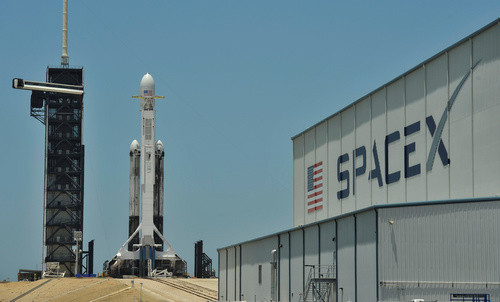SpaceX will launch a cargo rocket to the International Space Station (ISS) later this week, and onboard will be an image honoring the 50th anniversary of Apollo 11's historic mission to the moon.
Rocketman Elon Musk is the founder of SpaceX. He's a big fan of the lunar landing and of landing to other places, too.
It was on July 20, 1969, when Apollo 11 mission commander Neil Armstrong took a giant leap and became the first man to set foot on the moon.
Lunar module pilot Buzz Aldrin joined Armstrong exactly 19 minutes later for a moonwalk, setting the stage for international space exploration... and sparked the curiosity of this little boy in South Africa.
Inspiration
"You came along two years after Apollo 11 and yet space seems to be in your (bone) marrow," Jeffrey Kluger, who is Time Magazine editor-at-large, said in an interview with Musk.
"Apollo 11, landing on the moon, was probably the most inspiring thing in history. It (suddenly) inspired me; I don't think SpaceX would exist if not for Apollo 11," Musk - who was born two years after the moon landing - said.
Musk is the founder, chief executive officer and lead designer of Space Exploration Technologies (SpaceX), a privately-held firm which designs, manufactures, and launches advanced rockets and spacecraft. He is also the CEO and co-founder of Tesla, maker of electric cars.
Mars, here we come
SpaceX's ambitions go beyond mere space travel. "We expect to have a base on the moon, that we would be sending people to Mars," Musk emphasized. Since NASA ended its space shuttle program in 2011, SpaceX has continued Apollo 11's legacy in space exploration with its own aggressive technological campaigns.
The Hawthorne, California-based company was founded in 2002 to reshape space technology, with the ultimate goal of enabling people to travel and live on other planets. It has more than 6,000 employees across the United States and registered over a hundred successful launches representing more than $12 billion in the contract.
The $415-billion business
The world watched as Armstrong and Aldrin walked on the moon, the turning point of a near decade-long competition between the United States and the Soviet Union for the bragging rights of the world's technological superpower.
Fifty years later, a new space rivalry has emerged, not between two economic powerhouses, but private companies backed by some of the wealthiest men alive: Richard Branson of Virgin Galactic, Jeff Bezos of Blue Origin, and Elon Musk.
"Everybody's talking about space again," said Rich Cooper, Vice President of Strategic Communications and Outreach at the Space Foundation.
The global space economy, according to the Space Foundation, has a current market value of $414.75 billion, with over 50% of this coming from commercial space products and services.





